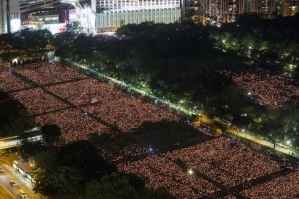The Tiananmen Square Massacre of 1989 has taken on a special meaning this year in Hong Kong, the only city in China where commemorations can be openly held. That's because it is occurring under the backdrop of pro-democracy protests that have placed the city at odds in mainland China and even divided the protesters themselves.
According to Elaine Yu and Wilfred Chan of CNN, Hong Kong holds the world's largest annual mass gathering to commemorate the Tiananmen Square crackdown, complete with candlelight, pro-democracy anthems and people dressed in black by the thousands. However, some younger people in Hong Kong have refused to attend this year's vigil run by older activists.
"Last fall's Occupy movement birthed a new generation of young pro-democracy Hong Kongers who organize on the Internet, refuse to identify as Chinese and are eager for aggressive confrontation," Yu and Chan wrote. "They've lost patience with Hong Kong's older generation of activists, who identify with the movement for democracy in China but have failed to secure tangible democratic gains for Hong Kong."
CNN reported that the vigil also acts as an "expression of fierce discontent with the governments of China and Hong Kong." Many of its participants shout anti-Communist slogans and have asked Hong Kong's chief executive, who is backed by Beijing, to resign; the crowds joining their ranks have recently swelled in size.
"When Britain returned Hong Kong to Chinese rule in 1997, the two countries agreed Hong Kong would enjoy a 'high degree of autonomy' for 50 years and eventually develop an election system based on universal suffrage," Yu and Chan wrote. "But nobody agrees on what that actually means."
According to CNN, China proposed that Hong Kong citizens would be allowed to vote for their own leaders, provided that Beijing approved them first. That proposal led to massive pro-democracy street protests that lasted for 79 days last fall.
"Those demonstrations -- known as 'Occupy' or the 'Umbrella Movement' -- were ultimately dispersed by police but deepened rifts in the city and angered Beijing," Yu and Chan wrote.
CNN reported that the Chinese government has done its best to block Internet search results of "June 4" and "Tiananmen Square" on the mainland. It has described the crackdown as an "incident" or a "counterrevolutionary riot" that had to be eliminated.
"In the spring of 1989, thousands of Chinese students marched into Beijing's Tiananmen Square to call for democracy," Yu and Chan wrote. "Following weeks of peaceful protests, troops acted on the orders of Chinese Communist Party leaders to open fire on civilians and students in the early hours of June 4, ending the mass demonstrations."
Rishi Iyengar of Time elaborated on how parts of Hong Kong commemorated the somber event.
"People began pouring in to the large public park in Hong Kong's downtown Causeway Bay district by 6 p.m., two hours before the sweltering vigil officially began, and continued to arrive well after it started," Iyengar wrote. "Volunteers from various political parties and civil society groups lined the approach, addressing the crowd through loudhailers, attempting to raise funds and-this being pragmatic, capitalist Hong Kong-selling fans and small folding chairs."

According to Time, organizers estimated the crowd at the city's Victoria Park to be around 130,000 people. The crowd observed a minute of silence and held candles high in the air.
"As is customary, replicas of the Monument to the People's Heroes-a tall obelisk in Tiananmen Square-and a statue of the 'Goddess of Democracy' were paraded high above the crowd, with wreaths being laid at their feet to commemorate the dead," Iyengar wrote.
Even though there was a generational split, some younger protesters showed up at the vigil.
"I don't want Hong Kong to get worse," 22-year-old Pak Lam-wong said. "If I have children one day, I want to tell them about this event. I want to know more."
A 19-year-old man from China's Hebei province told Iyengar that he lamented the lack of information and openness in the mainland. He was afraid to give out his name.
"I want to remember this, most people in China have forgotten this history," the unidentified young man said. "They are chasing the same goal as Hong Kong's people-freedom, liberty and justice. China has really divided mainland China and Hong Kong people into two parts."
Mak Hoi-wah, vice chairman of the Hong Kong Alliance in Support of Patriotic Democratic Movements in China, told Iyengar on the eve of the vigil that he didn't expect everyone to pay tribute in the exact same way.
"People may have different views on organizing it, maybe they think that this is not the way that they should pay tribute," Mak said of the younger generation of protesters. "They are free to do so. We are not expecting everybody to do it in the same way, but don't forget June 4."







